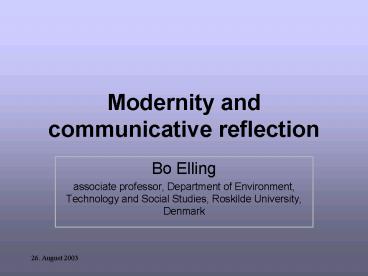Modernity and communicative reflection PowerPoint PPT Presentation
1 / 11
Title: Modernity and communicative reflection
1
Modernity and communicative reflection
- Bo Elling
- associate professor, Department of Environment,
Technology and Social Studies, Roskilde
University, Denmark
2
Type of action Criteria for
validity Teleological action
(science) (strategic) - cognitive-instrumental
action efficiency Normregulated action
(moral) - moral-practical rationality right
Dramaturgically action (art) - aesthetic
expressive rationality truthfulness Communicat
ive action - communicative rationality
truth, right, truthful (cognitive, moral,
aesthetic)
3
Beck - new epoch with reflexive
modernization - reflexivity is problematic -
individual reflexivity rational choice
interpretation Giddens - high modernity or
late modernity - reflexivity is problematic -
individual reflexivity rational choice
interpretation Mol - institutional
reflexivity - reflexivity is something good -
solution - excludes the purposive institutional
reduction of reflexivity Hajer -
institutional reflexivity - reflexivity is
something good solution - choose the right form
of reflexivity - no concept of rationality
4
- full information
- scientific knowledge -
the public shall have information - public
participation shall be improved -
proposals, with bought down effects easier to
legitimate
5
- defined systemically - the
process oriented towards results - the
knowledge exclusively scientific -
rationality exclusively cognitive-instrumental -
ruled by experts - public
available for information
6
- Teleontological optimising of
environmental care - - defined objectives
- - alternatives that implement the
objectives with optimal -
environmental care - - the environment becomes a mean
- - goal-directed
7
Deontological optimising of environmental
care - objectives and means are free
to be chosen - alternatives that optimise
environmental care decide the means - the
environment becomes values to be
protected - seeking or homing for
objectives
8
- Requirement for the participants (examples)
- - communicate
- - truthful statements
- - oriented towards validity claims
- - justify their arguments
- - willing to leave individual perspectives
- - accept overruling of better arguments
- Principles for priorities in discourses
- - dialogic over monologue
- - rational consensus over rational compromise
- - tolerance over intolerance
- - knowledge over meaning, attitude or belief
- - universal over particular
9
Developer - maximum profit as
the goal - arguing result-orientated -
use experts systemically as a
cognitive-instrumental action - institution
al or systemic reflexivity
10
- Administration
- - maximum legitimacy as the goal
- - arguing result-orientated
- - use experts systemically as a
cognitive-instrumental action - - institutional or systemic reflexivity
- - have to make assessments using
reflexive arrangements ad hoc
11
Citizens - oriented towards
understanding goals as well as means - use of
experts socially as a communicative rational
action - social reflexivity

